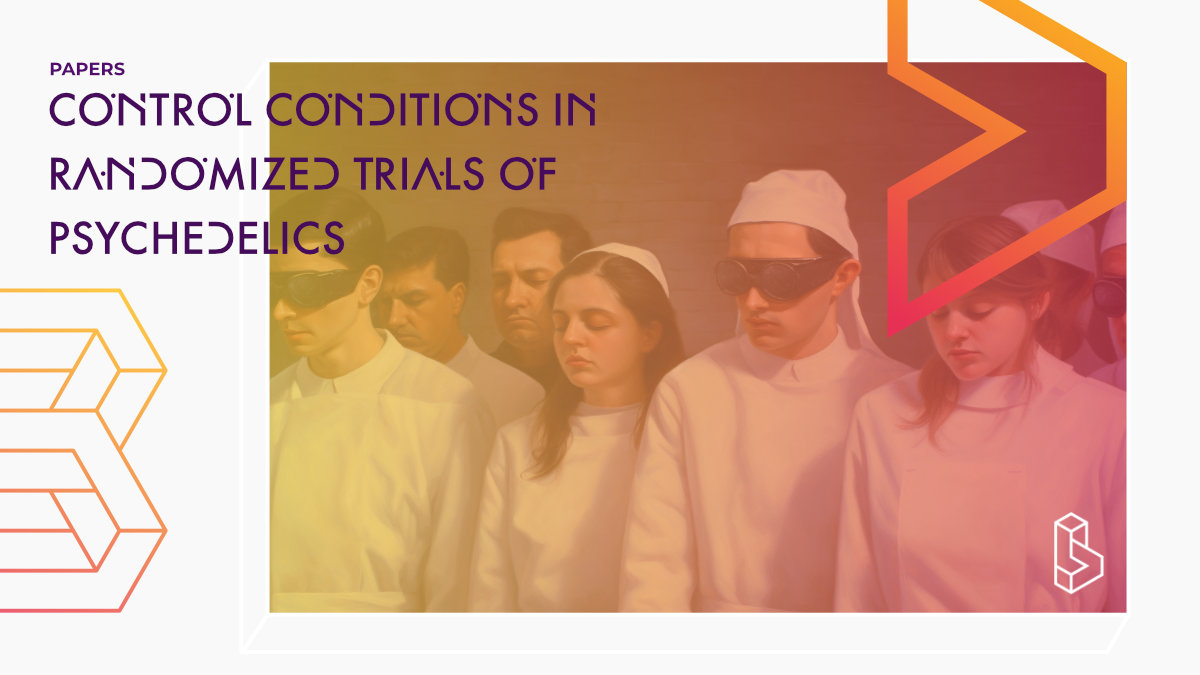This systematic review (2023, s=86) of psychedelic RCTs (up to May 2020) finds that for placebo, 61% used an inert control, 20% active comparators (e.g. niacin), 15% both, and 4% a lower psychedelic dose. Of the 21 therapeutic trials, only 3 (14%) compared different amounts of therapy. Most studies were blinded, but less than 20% tested blinding (generally poor).
Abstract of Control Conditions in Randomized Trials of Psychedelics
“Objective: To systematically review control conditions of all available randomized psychedelic trials.
Data Sources: We searched PubMed, PsycINFO, and EMBASE for randomized trials of psychedelics in humans from 1940 through May 2020 with no language restrictions. PRISMA guidelines were followed. (PROSPERO registration number: PROSPERO-CRD42020205341.)
Study Selection: All randomized trials of psychedelics in humans from 1940 through May 2020 were included.
Data Extraction: Two independent reviewers performed extraction. Extracted data included study design, demographics, blinding type, whether and how blind integrity was assessed, psychedelic used and dose, drug control condition and dose, type of non-drug control condition, number of dosing sessions, and recruitment source. Outcome data were not collected.
Results: In total, 126 articles were included, encompassing 86 unique studies. Of studies with a drug control condition (80), 49 (61.2%) used an inert placebo control, 16 (20.0%) used active comparators, 12 (15.0%) used both, and 3 (3.8%) used only different active psychedelic doses as a control. Only 3 of 21 therapeutic trials compared the use of psychological support to a minimally supportive condition. The majority (81/86; 94%) of studies were blinded, though only 14 (17.3%) included blind assessment; only 8 of these 14 studies assessed participants’ blinding. Blinding success, assessed in highly varied ways, was generally poor.
Conclusions: Randomized psychedelic trials underutilize elements that would improve quality or provide important information: blind assessment, active drug controls, and testing psychological support against minimal-support conditions. Several queried categories, including blind integrity assessment and details of non-drug control conditions, were insufficiently reported by many reviewed studies. Recommendations are provided to improve trial methods.“
Authors: Sandeep M. Nayak, Melissa K. Bradley, Bethea A. Kleykamp, Eric C. Strain, Robert H. Dworkin & Matthew W. Johnson
Summary of Control Conditions in Randomized Trials of Psychedelics
Psychedelic drugs have gained popularity as therapeutic agents, but several methodological concerns have been raised regarding the adequacy of existing control conditions in psychedelic trials. These concerns include unblinding due to powerful subjective effects and high levels of interpersonal support.
Psychedelic clinical trials can be under informative due to unblinding, which can cause therapeutic effects to be conflated with active intervention effects. Alternative designs, such as open-label comparative efficacy studies, provide complementary information.
Find this paper
Control Conditions in Randomized Trials of Psychedelics: An ACTTION Systematic Review
Paywall | Google Scholar | Backup | 🕊
Cite this paper (APA)
Nayak, S. M., Bradley, M. K., Kleykamp, B. A., Strain, E. C., Dworkin, R. H., & Johnson, M. W. (2023). Control Conditions in Randomized Trials of Psychedelics: An ACTTION Systematic Review. Journal of Clinical Psychiatry.
Study details
Authors
Authors associated with this publication with profiles on Blossom
Matthew JohnsonMatthew Johnson is an Associate Professor of Psychiatry and Behavioral Sciences at Johns Hopkins University. His research is concerned with addiction medicine, drug abuse, and drug dependence.
Linked Research Papers
Notable research papers that build on or are influenced by this paper
Blinding and Expectancy Confounds in Psychedelic Randomised Controlled TrialsThis systematic review (2021) argues that de-blinding (breaking blind) in randomized controlled trials (RCTs) of psychedelic therapies is leading to a (not defined/measurable) over-estimation of the outcomes (outside clinical trials). The authors suggest measures to tackle this and to use caution interpreting the existing RCTs.

